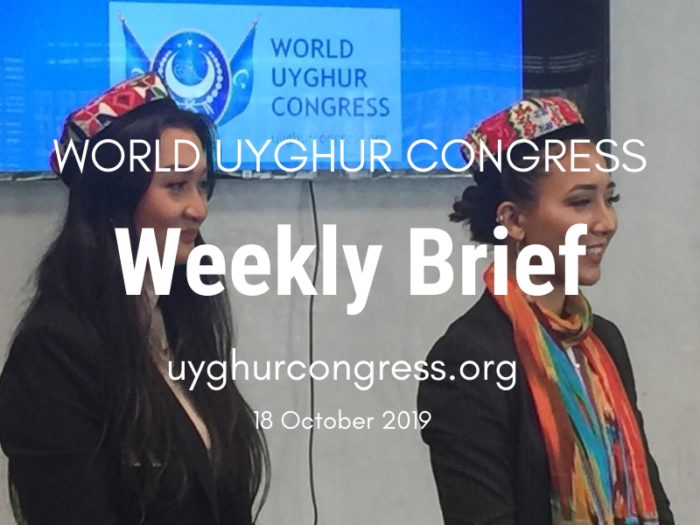Weekly Brief: October 18

World Uyghur Congress, 18 October 2019

WUC Representatives Attend a U.S. Consulate General Meeting in Munich
On October 11, WUC Representatives were invited to the U.S. Consulate General Youth Advisory Council (YAC) Meeting, in Munich to present the Uyghur human rights crisis.
The YAC is a small group of around about 7-8 of high schools students with different backgrounds all between 16-18, who are interested in various topics.
WUC staff presented the Uyghur culture and identity, for a better understanding of who the Uyghurs are. They then gave a presentation on the current crisis, covering the surveillance and security issue, the internment camps, and all the other human rights violations occurring in East Turkistan today.
The students, as well as delegates of the Consulate were very receptive, and the Q&A period allowed everyone to share their views and questions about the current crisis. Contacts information were shared and the representatives talked about how to support the cause and the WUC.
WUC President Speaks at the Forum 2000 Meeting in Prague
On October 15, WUC President Dolkun Isa spoke at the Forum 2000 Meeting in Prague, titled ‘’Human Rights in China: from bad to worse’’. He addressed the internment camps issue in East Turkistan. He also expressed deep concern about how China is using illegal mass surveillance and profiling strategies to target the Uyghurs, and monitor every aspect of their lives. Among the guests that attended this meeting were Czech Ministers, former state presidents, foreign affairs Ministers, nobel prize winners, journalists and human rights activists.
WUC Announces Uyghur Media Training in Brussels
On October 15, the WUC announced a Uyghur Media Training to be held in Brussels, Belgium from December 7-9. This seminar aims to provide Uyghur activists with the skills, knowledge and context to aid them in engaging with different forms of media in an effective and responsible way. The workshop will focus on the different opportunities and challenges through different forms of media engagement, especially social media and work with the press.
Media and communication experts will work with participants to improve their communication skills and media strategy over the course of the three-day workshop in order to improve capacity. The workshop will also focus on the need for a careful, strategic and evidence-based approach for Uyghur activists. The WUC strongly encourages and prioritizes Uyghur youth participation. The application deadline is October 21.
Target Australia and Cotton On Group Stop Sourcing Cotton from East Turkistan
On October 17, Cotton On Group and Target Australia announced they have stopped buying cotton from East Turkistan due to alarming concerns about mass human rights abuses by Chinese government. This comes following the internal investigation that was completed by Cotton on Group into its supply chain. In July, Four Corners revealed that Uyghurs were being rounded up and sent to internment camps, as part of a detention program and forced to work in textile factories in the Uyghur region. Cotton On Group sourced its cotton from Litai Textiles factory, which is located 6km away from an internment camp. Other Australian branches of brands like Jeanswest, Ikea, Dangerfield and H&M were also revealed to source cotton from the region. East Turkistan is China’s largest cotton producer.
At the beginning of October, the U.S. Commerce Department imposed visa restrictions on Chinese officials suspected of repressing Uyghurs and other ethnic minorities. It also restricted the export of US products to 28 Chinese Government and entities for their complicity in human rights violations in East Turkistan. In response, the Chinese embassy in the U.S. tweeted: ‘’Xinjiang affairs are purely China’s internal affairs that allow no foreign interference. We urge the US to correct its mistakes at once and stop its interference in China’s internal affairs.’’
This shows that the West is directly profiting from forced labour and human rights violations in the Uyghur region, and therefore supporting China in its authoritarian policies.

